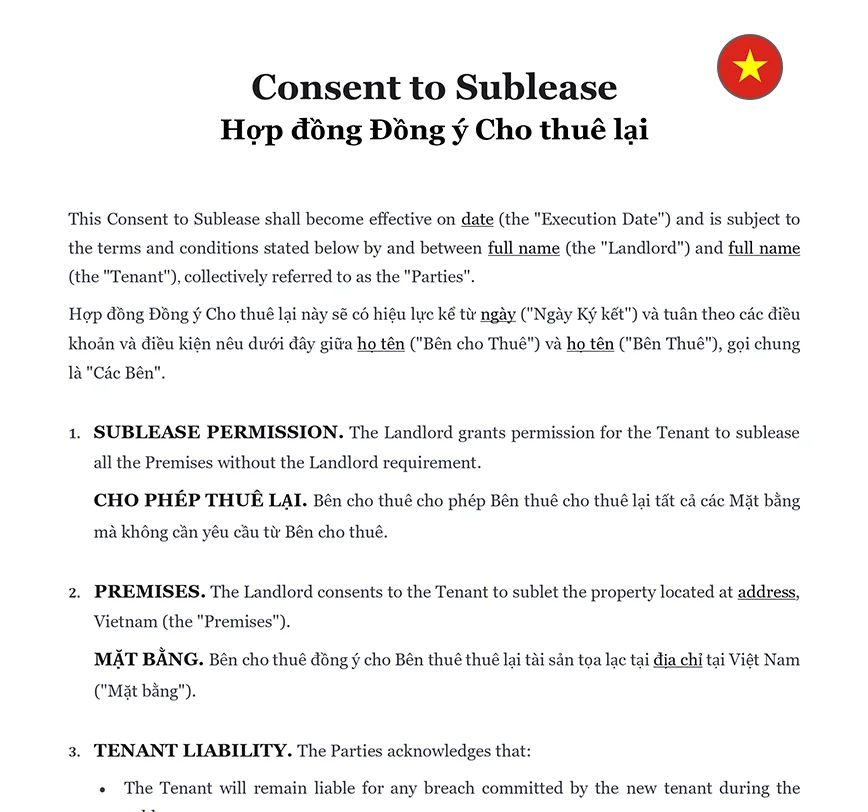Ready to use legal template
Drafted by experienced lawyers
Vietnamese-English translation
Ready to use legal template
Drafted by lawyers
Vietnamese-English translation
Home › Rent your property › Consent to sublease
Learn more about Consent to Sublease in Vietnam
A Consent to Sublease is a legal document used by landlords to grant permission to their tenants to sublease the property to another party. This document outlines the terms and conditions under which the sublease is permitted, including any restrictions or requirements imposed by the landlord. The consent to sublease is a critical component linked to the Sublease Agreement. Themis Partner’s template is provided in an easy-to-edit Word format, allowing you to customize it to your specific needs quickly and efficiently. Our Consent to Sublease document template is expertly crafted by our legal team in Vietnam to ensure compliance with local laws.
Table of contents
-
What is a Consent to Sublease?
-
What is included in a Consent to Sublease?
-
What factors should I consider to consent to a sublease?
-
Can I impose any conditions or restrictions on a sublease?
-
How long do I have to respond to a request for Consent to Sublease?
-
Can I refuse to consent to a sublease in Vietnam?
-
Do I have to approve the new subtenant in Vietnam?
-
Can my tenant sublease the property without my permission?
What is a Consent to Sublease?
A Consent to Sublease is a formal agreement issued by a landlord, allowing a tenant to lease part or all of a property to another individual, known as the subtenant. This document sets out the specific terms and conditions under which the sublease is permitted and typically requires the subtenant to comply with the original lease agreement between the landlord and the tenant. The Consent to Sublease is crucial as it ensures that the landlord is informed of and consents to the arrangement, safeguarding their rights in the property. It also promotes clear communication among all parties and can help prevent conflicts or confusion regarding the sublease.
What is included in a Consent to Sublease?
A Consent to Sublease is important as it ensures that the subleasing arrangement is conducted with the landlord’s approval and in compliance with the terms of the original lease agreement. It typically includes the following elements:
1. Parties: Identifies the landlord, the tenant (sublessor), and the subtenant.
2. Property Details: Specifies the address and any relevant details of the property being subleased.
3. Term of Sublease: States the duration of the sublease, including the start and end dates.
4. Rent: Specifies the amount of rent the subtenant will pay and the schedule for payment.
5. Responsibilities: Outlines the responsibilities of the subtenant, such as maintenance and utilities.
6. Conditions: Any specific conditions or restrictions imposed by the landlord, such as restrictions on further subleasing.
7. Consent Clause: States that the landlord consents to the sublease under the specified terms.
8. Notarization: In some cases, the consent to sublease may need to be notarized to be legally valid.
What factors should I consider to consent to a sublease?
Consenting to a sublease is a significant decision that can impact the landlord-tenant relationship and the condition of the property. When considering whether to consent to a sublease, landlords should consider the following factors:
| ➤ Financial Stability: Assess the financial stability of the proposed subtenant to ensure they can afford the rent and other expenses associated with the property. |
| ➤ References: Request references from the proposed subtenant to verify their reliability and suitability as a tenant. |
| ➤ Use of Property: Consider how the subtenant intends to use the property and whether it aligns with the original lease agreement and any applicable laws or regulations. |
| ➤ Maintenance: Determine whether the subtenant will be responsible for maintaining the property and if they have the capability to do so. |
| ➤ Insurance: Ensure that the subtenant has appropriate insurance coverage, such as liability insurance, to protect against any potential damages or accidents. |
| ➤ Communication: Maintain open communication with the tenant and subtenant to address any concerns or issues that may arise during the sublease period. |




